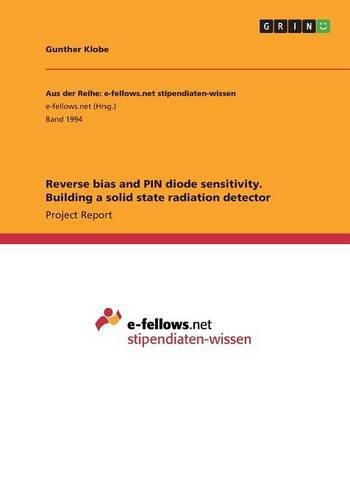Readings Newsletter
Become a Readings Member to make your shopping experience even easier.
Sign in or sign up for free!
You’re not far away from qualifying for FREE standard shipping within Australia
You’ve qualified for FREE standard shipping within Australia
The cart is loading…






Project Report from the year 2014 in the subject Physics - Experimental Physics, grade: Bestnote, Swiss Federal Institute of Technology Zurich (Institute for Astronomy), course: Semesterarbeit / Projektarbeit, language: English, abstract: This is a report on a research internship at the University of Oxford in the summer of 2014, which describes the final experimental steps in preparing a prototype of a solid state radiation detector based on a PIN diode. This device has multiple possible applications, e.g. it can be used to monitor cosmic radiation and space weather, which is a topic of great interest for space agencies, satellite networks, and insurance companies. The project was a success and the prototype was ready for a test flight in the end. A prototype of a solid state radiation detector based on a PIN diode has been developed to the point where it was ready for a test flight on a weather balloon. This device is intended to be used to monitor secondary cosmic radiation and may have the potential to be produced commercially since space weather is an issue of growing importance concerning the economy and technology of modern civilisation. Some of the most crucial experimental work in preparation for the test flight is discussed in this report. One important question was what reverse bias should be applied to the PIN diode. As a result, it was found that the detector’s sensitivity increases with increasing reverse bias until it reaches a saturation value at 25V. Another concern was that the prototype may not be robust against temperature differences. This concern could be ruled out to a certain extent.
$9.00 standard shipping within Australia
FREE standard shipping within Australia for orders over $100.00
Express & International shipping calculated at checkout
Project Report from the year 2014 in the subject Physics - Experimental Physics, grade: Bestnote, Swiss Federal Institute of Technology Zurich (Institute for Astronomy), course: Semesterarbeit / Projektarbeit, language: English, abstract: This is a report on a research internship at the University of Oxford in the summer of 2014, which describes the final experimental steps in preparing a prototype of a solid state radiation detector based on a PIN diode. This device has multiple possible applications, e.g. it can be used to monitor cosmic radiation and space weather, which is a topic of great interest for space agencies, satellite networks, and insurance companies. The project was a success and the prototype was ready for a test flight in the end. A prototype of a solid state radiation detector based on a PIN diode has been developed to the point where it was ready for a test flight on a weather balloon. This device is intended to be used to monitor secondary cosmic radiation and may have the potential to be produced commercially since space weather is an issue of growing importance concerning the economy and technology of modern civilisation. Some of the most crucial experimental work in preparation for the test flight is discussed in this report. One important question was what reverse bias should be applied to the PIN diode. As a result, it was found that the detector’s sensitivity increases with increasing reverse bias until it reaches a saturation value at 25V. Another concern was that the prototype may not be robust against temperature differences. This concern could be ruled out to a certain extent.